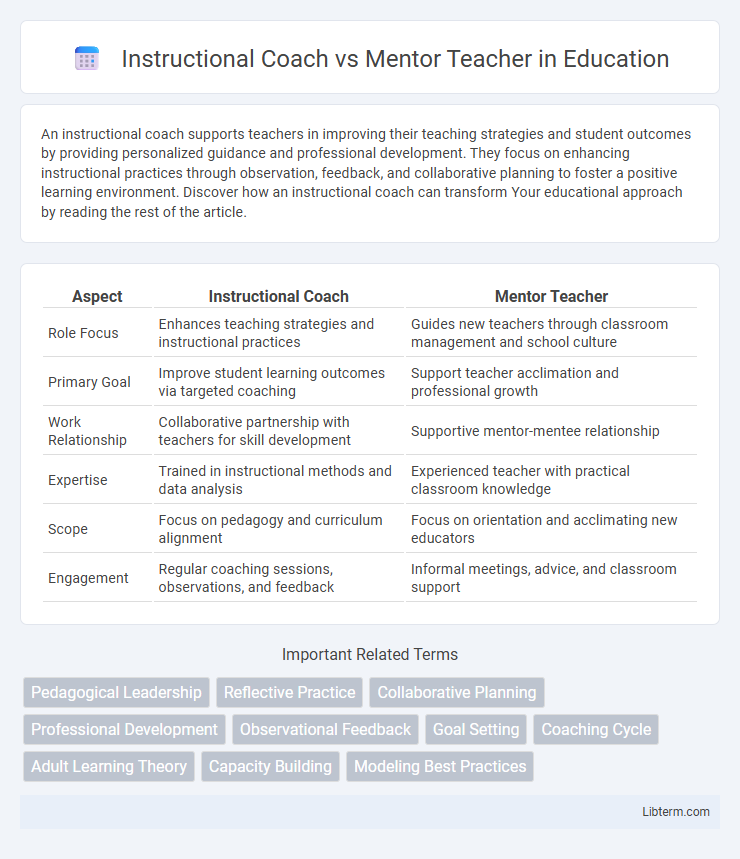An instructional coach supports teachers in improving their teaching strategies and student outcomes by providing personalized guidance and professional development. They focus on enhancing instructional practices through observation, feedback, and collaborative planning to foster a positive learning environment. Discover how an instructional coach can transform Your educational approach by reading the rest of the article.
Table of Comparison
| Aspect | Instructional Coach | Mentor Teacher |
|---|---|---|
| Role Focus | Enhances teaching strategies and instructional practices | Guides new teachers through classroom management and school culture |
| Primary Goal | Improve student learning outcomes via targeted coaching | Support teacher acclimation and professional growth |
| Work Relationship | Collaborative partnership with teachers for skill development | Supportive mentor-mentee relationship |
| Expertise | Trained in instructional methods and data analysis | Experienced teacher with practical classroom knowledge |
| Scope | Focus on pedagogy and curriculum alignment | Focus on orientation and acclimating new educators |
| Engagement | Regular coaching sessions, observations, and feedback | Informal meetings, advice, and classroom support |
Understanding the Roles: Instructional Coach vs Mentor Teacher
Instructional coaches focus on enhancing teaching strategies through data-driven feedback and ongoing professional development, often working with multiple educators across subjects or grade levels. Mentor teachers provide personalized guidance based on direct experience, primarily supporting new or novice teachers within the same grade or subject area. Understanding these distinct roles helps schools implement targeted support systems that improve teacher effectiveness and student outcomes.
Key Responsibilities of Instructional Coaches
Instructional coaches primarily focus on enhancing teaching practices through data-driven feedback, personalized professional development, and modeling effective instructional strategies. They collaborate with teachers to analyze student data, identify areas for improvement, and implement research-based interventions to boost student achievement. Unlike mentor teachers who provide guidance based on experience, instructional coaches emphasize continuous instructional improvement and frequently engage in classroom observations and targeted support.
Primary Duties of Mentor Teachers
Mentor teachers primarily focus on providing guidance and support to novice educators by sharing classroom management strategies, curriculum planning, and effective teaching techniques. They observe lesson delivery, offer constructive feedback, and foster professional growth through personalized coaching tailored to the mentee's needs. Unlike instructional coaches who may work with teachers across experience levels on broader instructional practices and data-driven improvements, mentor teachers emphasize hands-on, day-to-day mentorship within the primary teaching environment.
Qualifications and Backgrounds Required
Instructional coaches typically require advanced degrees in education, extensive teaching experience, and specialized training in coaching strategies and adult learning theories, emphasizing their role in supporting teacher development and instructional improvement. Mentor teachers usually possess substantial classroom experience, often with a proven track record of effective teaching, and may be selected for their expertise in subject matter or grade-level proficiency to guide novice or struggling educators. Both roles demand strong communication skills and a commitment to professional growth, but instructional coaches often engage in formal certification or ongoing professional development specific to coaching methodologies.
Coaching vs Mentoring: Core Differences
Instructional coaches focus on improving teaching strategies through targeted support and data-driven feedback, emphasizing professional development to enhance instructional practices. Mentor teachers provide guidance based on experience, fostering career growth by sharing knowledge, offering emotional support, and modeling classroom management techniques. Coaching revolves around performance improvement and skill-building, while mentoring centers on relationship-building and holistic teacher development.
Impact on Teacher Development and Growth
Instructional coaches provide targeted support through data-driven strategies and personalized feedback, driving measurable improvements in teacher performance and student outcomes. Mentor teachers emphasize relationship-building and experiential guidance, fostering professional confidence and practical skill development over time. Both roles cultivate teacher growth, with instructional coaches accelerating instructional refinement and mentors nurturing foundational teaching practices.
Collaboration and Support Methods
Instructional coaches use data-driven strategies and modeling techniques to collaboratively improve teacher practices through structured coaching cycles, goal setting, and reflective feedback. Mentor teachers provide ongoing, experience-based guidance by sharing classroom management tips, curriculum insights, and personalized support tailored to novice teachers' needs. Both roles emphasize collaboration but differ in approach: instructional coaches focus on performance improvement through targeted interventions, while mentor teachers foster professional growth via relationship-building and practical advice.
Effectiveness: Measuring Outcomes
Instructional coaches impact teacher performance by using data-driven strategies to improve instructional practices, resulting in measurable student achievement gains. Mentor teachers provide personalized support and share classroom management techniques, fostering teacher confidence and professional growth. Effectiveness is often measured through improved student test scores, teacher retention rates, and qualitative feedback on teaching effectiveness.
Choosing the Right Support Role for Your School
Selecting the appropriate support role for your school depends on the specific goals and needs of your educators; Instructional Coaches specialize in data-driven teaching strategies and continuous professional development, while Mentor Teachers provide personalized guidance and share classroom experience with new or struggling teachers. Instructional Coaches often use observation and feedback cycles to enhance instructional practices school-wide, whereas Mentor Teachers focus on building foundational skills and fostering confidence in individual mentees. Understanding these distinct functions ensures targeted support that effectively improves teacher performance and student outcomes.
Integrating Instructional Coaches and Mentor Teachers
Integrating instructional coaches and mentor teachers enhances professional development by blending coaching strategies with hands-on classroom experience. Instructional coaches focus on improving teaching practices through targeted feedback and data-driven strategies, while mentor teachers provide personalized guidance based on years of classroom expertise. The collaboration between these roles supports a comprehensive approach to teacher growth, combining observational insights with ongoing instructional support.
Instructional Coach Infographic

 libterm.com
libterm.com